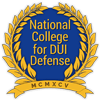The Horizontal Gaze Nystagmus (HGN) Test is a standardized field sobriety test used to help law enforcement determine whether or not an individual is under the influence of alcohol. Most field sobriety tests are designed to test the suspect’s coordination and ability to a balance. HGN testing is different. The term “nystagmus” refers to an involuntary jerking of the eye that occurs when you look to the side. Although certain levels of movement are normal, alcohol impairment can cause nystagmus to occur when the eye is looking forward. HGN testing is 77% accurate when used to detect alcohol impairment in individuals with a BAC that exceeds .10%.
HGN testing is simple. During the test, the subject’s face should be lit so that the officer can clearly see any eye movement. To administer the HGN test, the officer simply holds a small object, such a pen or penlight, in front of the subject’s eyes and moves it back and forth. If the nystagmus occurs within forty five degrees of the center of the eye, the subject may be impaired. The officer will also check for vertical nystagmus by moving the object up and down, through the subject’s entire field of vision. The HGN test must be administered by a trained police officer in order to be used as evidence for a DUI arrest. If the test is administered incorrectly, failure cannot be held against the suspect in court.
A variety of factors determine whether or not the individual will pass or fail the HGN test. During the test, the officer must observe if the suspect’s eyes experience nystagmus at maximum deviation, and whether or not the suspect’s eyes can smoothly track the object. Unfortunately, these clues are not always accurate. In fact, a number of medical conditions and other circumstances can interfere with test results.
For example: pathological disorders may cause the eye to tremor within forty five degrees of its center. Brain tumors, brain damage, and inner ear disorders may cause nystagmus as well. In order to use HGN testing as evidence in court, the officer must administer the test according to specific standards. Additionally, the Test must be considered scientific and reliable by the court.
The HGN test is only admissible in court if it is deemed “scientific evidence.” Some courts only consider HGN testing to be a “physical observation,” while others regard the test as an actual way to determine whether or not a person is under the influence of alcohol. HGN testing can only be used as evidence in a DUI case if the court acknowledges a scientific relationship between nystagmus and alcohol consumption.










